
Kenneth M. Levine is an American video game developer. He is the creative director and co-founder of Ghost Story Games. He led the creation of the BioShock series and is also known for his work on Thief: The Dark Project and System Shock 2.
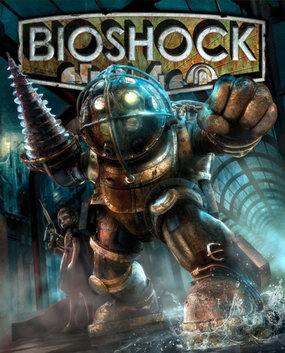
BioShock is a 2007 first-person shooter game developed by 2K Boston and 2K Australia, and published by 2K. The first game in the BioShock series, it was released for Microsoft Windows and Xbox 360 platforms in August 2007; a PlayStation 3 port by Irrational, 2K Marin, 2K Australia and Digital Extremes was released in October 2008. The game follows player character Jack, who discovers the underwater city of Rapture, built by business magnate Andrew Ryan to be an isolated utopia. The discovery of ADAM, a genetic material which grants superhuman powers, initiated the city's turbulent decline. Jack attempts to escape Rapture, fighting its mutated and mechanical denizens, while engaging with the few sane survivors left and learning of the city's past. The player can defeat foes in several ways by using weapons, utilizing plasmids that give unique powers, and by turning Rapture's defenses against them.

A Big Daddy is a fictional character in the BioShock series of video games. Big Daddies are heavily spliced human beings who have had their bodies directly grafted into heavily armored, steampunk-inspired atmospheric diving suits. They are armed with a rivet gun, heavy drill, rocket launcher, or ion laser. Alpha series Big Daddies are equipped with any of several other weapons as well. Though they make low-pitched groaning noises similar to whales, their vocalizations were performed by voice actor Stephen Stanton. Designed by Irrational Games, they first appeared in BioShock and were promoted heavily. A six-inch Big Daddy action figure was included in the limited edition version of the title. In its sequel, BioShock 2, the player controls a prototype Big Daddy.

BioShock 2 is a first-person shooter video game developed by 2K Marin and published by 2K Games. It was released worldwide for PlayStation 3, Windows, and Xbox 360 on February 9, 2010; Feral Interactive released an OS X version on March 30, 2012. The game takes place in the dystopian underwater city of Rapture, eight years after the events of BioShock. In the single-player campaign, players control the armored protagonist Subject Delta as he fights through Splicers—the psychotic human population of the city—using weapons and an array of genetic modifications. The game includes a story-driven multiplayer mode that takes place before the events of BioShock, during Rapture's civil war.
Sander Cohen is a character in the BioShock video game series. He debuts in the first title of the series, developed by 2K Boston, as a celebrated polymath of the underwater city of Rapture who has a deranged and sadistic personality. The protagonist Jack is forced to help Cohen with the creation of a macabre sculpture, built around pictures of Cohen's former proteges whom he kills and photographs on his behalf, before he allows him to leave his domain Fort Frolic. Sander Cohen makes another appearance in BioShock Infinite: Burial at Sea, a downloadable content story expansion for BioShock Infinite which sets up the events of BioShock. He is voiced by T. Ryder Smith for all appearances.

Andrew Ryan is a fictional character in the BioShock video game series developed by Irrational Games. He is one of the main antagonists in BioShock, and also appears in its follow-ups BioShock 2 and BioShock Infinite: Burial at Sea. Ryan is portrayed as an idealistic business magnate in the 1940s and 1950s, aiming to create an underwater city called Rapture to avoid government oversight and scrutiny. As civil war erupts in Rapture, Ryan's utopian vision collapses into a dystopia, leading him to become reclusive and paranoid. After winning the war, he becomes increasingly ruthless in his control over the city's remaining inhabitants.

BioShock is a retrofuturistic video game series created by Ken Levine, published by 2K and developed by several studios, including Irrational Games and 2K Marin. The BioShock games combine first-person shooter and role-playing elements, giving the player freedom for how to approach combat and other situations, and are considered part of the immersive sim genre. Additionally, the series is notable for exploring philosophical and moral concepts with a strong in-game narrative influenced by concepts such as Objectivism, total utilitarianism, and American exceptionalism.
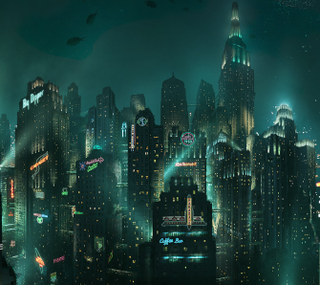
Rapture is a fictional city-state in the BioShock series published by 2K Games. It is an underwater city that is the main setting for the games BioShock and BioShock 2. The city also briefly appears in BioShock Infinite, and is featured in its downloadable content, Burial at Sea. The game's back-story describes the city as envisioned by business tycoon Andrew Ryan in the mid-late 1940s as a means to create a utopia for mankind's greatest artists and thinkers to prosper in a laissez-faire environment outside of increasing oppression by the world's governments and religion. However, the lack of government led to severe wealth disparity, a powerful black market, and unrestricted genetic modification, which turned the city into a dystopia exacerbated by Ryan's tyrannical methods to maintain control. The masses turned towards political activists like Atlas who advocated an uprising of the poor against Ryan and the elite of Rapture; and on the eve of 1959, a civil war broke out, leaving much of Rapture's population dead. The remaining citizens either became psychotic "Splicers" due to the effects of ADAM, a substance that can alter genetic material, or have barricaded themselves from the Splicers to protect themselves, leaving the city to fail and fall apart around them.
Brigid Tenenbaum is a fictional character in the BioShock video game series developed by Irrational Games. She is a German Jew who survived the Holocaust due to assisting in Nazi human experimentation, and was eventually invited to the underwater city of Rapture, where she continued human experimentation. She discovered a substance that altered DNA that was highly addictive, using little girls as hosts, before developing empathy for them and attempting to save them from their parasites.
The BioShock series is a collection of story-driven first-person shooters in which the player explores dystopian settings created by Ken Levine and his team at Irrational Games. The first two games, BioShock and its direct sequel, BioShock 2, take place in the underwater city of Rapture in 1960 and 1968, which was influenced heavily by Ayn Rand's Objectivism. The third installment, BioShock Infinite, is set aboard the floating air-city of Columbia in 1912, designed around the concept of American Exceptionalism. Though Infinite is not a direct sequel to the previous games, the game is thematically linked; a short scene within the core Infinite game returns to Rapture, while the downloadable content BioShock Infinite: Burial at Sea tie in many of the plot elements between BioShock and BioShock Infinite.
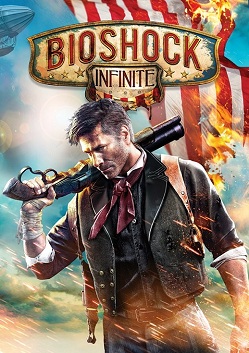
BioShock Infinite is a first-person shooter video game in the BioShock series, developed by Irrational Games and published by 2K. Infinite was released worldwide for the PlayStation 3, Windows, Xbox 360, and OS X platforms in 2013. The game is set in the year 1912 and follows its protagonist, Booker DeWitt, who is sent to the airborne city Columbia to retrieve Elizabeth, a young woman held captive there. Booker and Elizabeth become involved in a class war between the nativist Founders that rule Columbia and the rebel Vox Populi, representing the city's underclass. Elizabeth possesses the ability to manipulate "Tears" in the space-time continuum, and Booker and Elizabeth discover she is central to Columbia's dark secrets. The player controls Booker DeWitt throughout the game, fighting enemies and scavenging supplies, while the computer-controlled Elizabeth provides assistance.
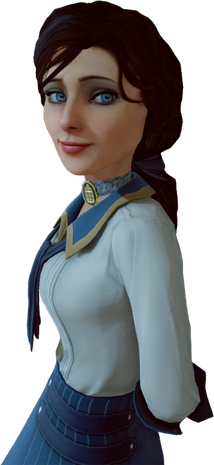
Elizabeth is a fictional character in Irrational Games' BioShock Infinite, the third title in the BioShock series. The game is set in 1912 on a floating steampunk city named Columbia which was founded on the principles of American exceptionalism. Elizabeth has been groomed in a controlled environment to take over the reins of the city once its current leader, Father Zachary Hale Comstock, dies. Elizabeth has the power to open "tears" in the fabric of reality; she is able to view every event across all of the infinite timelines simultaneously and effortlessly open doorways to them, allowing her to access parallel universes.
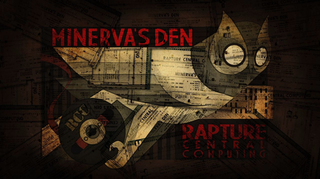
BioShock 2: Minerva's Den is a single-player downloadable content (DLC) campaign for the 2010 first-person shooter game BioShock 2, developed by 2K Marin and published by 2K Games. The player assumes the role of Subject Sigma, an armored and genetically modified human, or "Big Daddy"; Sigma must travel through Minerva's Den, the technological hub of the underwater city of Rapture, to download a schematic of the city's supercomputer. Gameplay is similar to that of BioShock 2, with new enemies and weapons.

The development of BioShock Infinite began after BioShock's release in August 2007. The five-year development, led by studio Irrational Games, began under the moniker "Project Icarus". Irrational's creative lead, Ken Levine was inspired by events at the turn of the 20th century and the expansion of the concept of American Exceptionalism set by the 1893 World's Fair in Chicago. His story took these events to create a tale set in 1912 where the player, as former Pinkerton agent Booker DeWitt, is challenged to rescue a young woman, Elizabeth, who has been kept aboard the floating city of Columbia in the middle of a civil war between its founder Father Zachary Comstock and the Vox Populi, the underclass revolting against him.
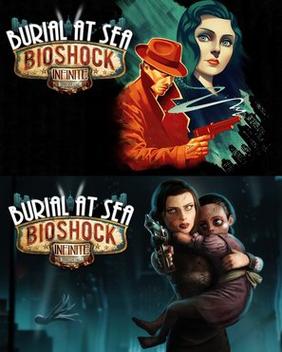
BioShock Infinite: Burial at Sea is a two-part single-player expansion to the first-person shooter video game BioShock Infinite. It was developed by Irrational Games and published by 2K Games for PlayStation 3, OS X, Windows, Xbox 360, and Linux platforms. Episode One was released digitally on November 12, 2013, followed by Episode Two on March 25, 2014. A retail version was released as part of BioShock Infinite: The Complete Edition, and later included in BioShock: The Collection for PlayStation 4, Xbox One, and Nintendo Switch.

Rod Fergusson is a Canadian video game producer, best known for overseeing the development of the Gears of War franchise, originally at Epic Games and then as head of The Coalition. More recently, Fergusson moved over to Blizzard Entertainment to oversee development on the Diablo series.
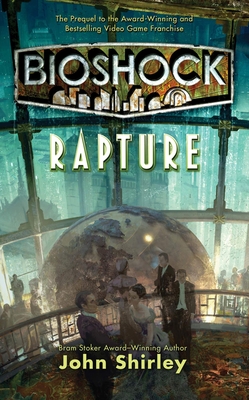
BioShock: Rapture is a 2011 science fiction novel written by John Shirley, published by Tor Books in the United States and by Titan Books in the United Kingdom. Rapture forms part of the BioShock retrofuturistic media franchise created by Ken Levine and published by 2K Games and developed by several studios, including Irrational Games and 2K Marin. A prequel to the first BioShock game the novel tells the story of how Andrew Ryan founded the underwater city of Rapture. The book follows multiple BioShock characters. The cover art was designed by Craig Mullins, who also produced the cover art for BioShock 2. It was released July 19, 2011.

BioShock: The Collection is a compilation of the BioShock video games, developed by Blind Squirrel Games and published by 2K Games. The Collection features upgraded versions of BioShock, BioShock 2, and BioShock Infinite, with new textures and support for higher resolution displays and framerates. The compilation was released in September 2016 for PlayStation 4, Xbox One, and Windows; versions for macOS and Nintendo Switch followed in August 2017 and May 2020, respectively.
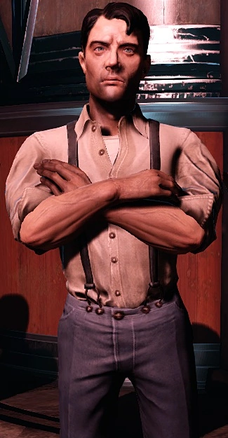
Atlas is a character in the BioShock video game series created by Ken Levine, published by 2K Games. He first appears in the first title of the series, where he sets himself up as a benefactor of Jack, the game's player character, upon his arrival in the underwater city of Rapture. During a pivotal scene later in the game's narrative, Atlas discloses that he is actually the crime lord Frank Fontaine in disguise, the main antagonist of the game, and that he had been manipulating Jack to act against the city's founder Andrew Ryan. It is also revealed that he is responsible for orchestrating Jack's mental conditioning during his infancy and later a chain of events that led to his subsequent arrival in Rapture. Atlas/Fontaine also appears in the sequel BioShock 2 through audio diaries, and more prominently in BioShock Infinite: Burial at Sea, a prequel which sets up the events of BioShock.















